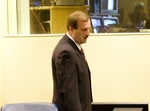Honoring the Srebrenica genocide victims: David Pettigrew reflects on 2024 commemoration

Prof. Dr. David Pettigrew, a distinguished Professor of Philosophy and Holocaust and Genocide Studies at Southern Connecticut State University and a member of the Steering Committee of the Yale University Genocide Studies Program, emphasizes the profound significance of the Srebrenica Genocide Commemoration in 2024 as detailed in his essay titled “Srebrenica Genocide Commemoration 2024: A Solemn Hour of Remembrance.”
Read the full essay:
"The commemoration of the Srebrenica Genocide takes on special significance this year following the official approval of the United Nations General Assembly Resolution designating 11 July as the “International Day of Reflection and Commemoration of the 1995 Genocide in Srebrenica”. The official international recognition provides important new support for survivors who are still burying the remains of their loved ones in the face of a surge of denial and hate speech.
The UN Resolution encourages and draws attention to the proliferation of commemorations around the world that are honoring the memory of the victims and affirming the truth about the Srebrenica genocide. The victims of the genocide will be remembered this year at an official high-level event at the United Nations in New York on July 11, organized by Ambassador Lagumdžija. Commemorations will also take place throughout the United Kingdom, in Ireland, Belgium, Switzerland, and elsewhere. And the Srebrenica Genocide will also be commemorated throughout the United States: including in St. Louis, Missouri, in Chicago, Illinois, and in Connecticut where the flag of Bosnia and Herzegovina will be raised.
With the UN Resolution there is crucial momentum for affirming the truth and for establishing a lasting culture of remembrance in order to prevent a repetition of the genocide. The UN Resolution condemned “any denial of the Srebrenica genocide”. Genocide scholars warn that denial causes re-victimization and incites a repetition of the violence. But the international community does not seem sufficiently aware or concerned about the dramatic increase of denial and threats to the peace in Republika Srpska and Serbia that have followed the passage of the UN Resolution.
In brazen opposition to the spirit of the UN Resolution, nationalist leaders in Republika Srpska and Serbia held the highly touted “All-Serb Assembly,” and published a “Declaration” calling for the unity of all Serb people in an updated version of “Greater Serbia,” the same “Greater Serbia” that motivated the international aggression and genocide against Bosnia in the 1990’s. The Declaration also explicitly condemned the UN Resolution and essentially denied the Srebrenica genocide.
It is a matter of great concern that the Declaration of the “All-Serb Assembly” presents Republika Srpska as an autonomous legal entity, lending support to Milorad Dodik’s dangerous plan for “peaceful disassociation” from Bosnia. In the same context, there is great concern among survivors about the proposal emanating from Bosnian Serb political representatives, to change the name of Srebrenica. More recently, the July 11 commemoration at Potočari was even characterized as a threat to security in Republika Srpska. All these are troubling provocations that threaten a repetition of the atrocities. Such threats require more severe condemnations and sanctions from the United States, United Kingdom, and the European Union.
Long before the UN Resolution, the Mothers of Srebrenica inspired us with their struggle for the truth of the Srebrenica Genocide to be recognized and for the victims to be remembered. They have testified at the Hague, brought legal action against the Netherlands for its liability for the genocide and advocated for the exhumation and identification of the victims. The Mothers advocated tirelessly for the establishment of a Memorial Center and Cemetery, a vision that the dedicated and capable leadership and staff of the Srebrenica Memorial Center have made a reality today.
On July 1, I was honored to attend the opening ceremony for a “Srebrenica Genocide Exhibition” at the UN Headquarters in New York, which was organized by the office of Ambassador Lagumdžija and the Srebrenica Memorial Center. The tireless Mothers of Srebrenica, Munira Subašić and Kada Hotić, attended and Munira addressed those who gathered. In his remarks Ambassador Lagumdžija referred to Memorial Center Director Emir Suljagić’s haunting observation that none of those at the Memorial Center who worked on this exhibition were supposed to be alive today. In other words, as Amra Begić Fazlić, Deputy Director of the Memorial Center took to the podium to officially open the exhibition, it was a poignant moment for her and for the Mothers of Srebrenica, since, according to the genocidal plan in 1995, they were not supposed to be here today. And yet here they were at the United Nations in New York opening a memorial exhibition to educate the world. It was inspirational for all of us.
As we commemorate the Srebrenica Genocide on July 11 this year in the face of unprecedented threats from the “Declaration” of the “All Serb Assembly” and other provocations it will indeed be a solemn hour of remembrance. With this commemoration let us renew our commitment to a culture of remembrance to educate future generations and prevent a repetition of the atrocities. As Srebrenica commemorations spread around the world, may that culture of remembrance extend to the establishment of memorial museums at Barutni magacin in Kalinovik and at the White House at Omarska. Now, more than ever, the United States, United Kingdom, European Union, and international community must protect survivors, stand for the truth, stand with the Mothers of Srebrenica, and stand with Bosnia."
Kakvo je tvoje mišljenje o ovome?
Učestvuj u diskusiji ili pročitaj komentare





 Srbija
Srbija
 Hrvatska
Hrvatska
 Slovenija
Slovenija



























































